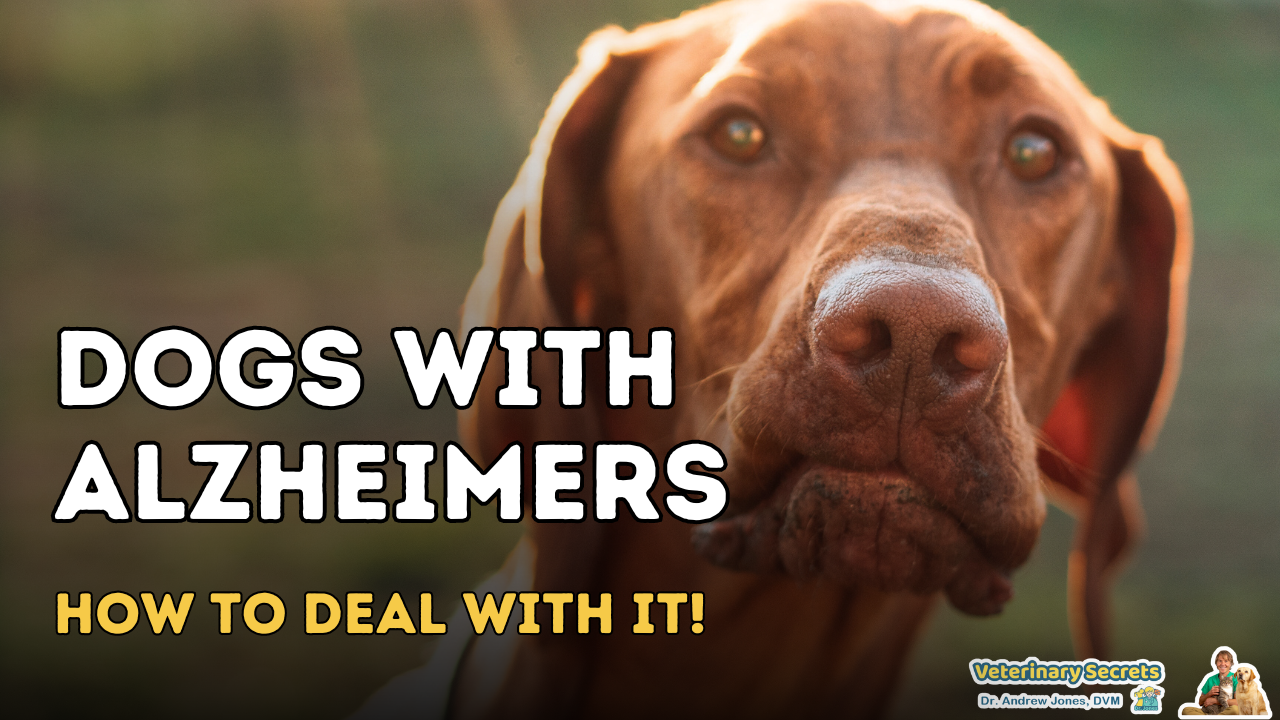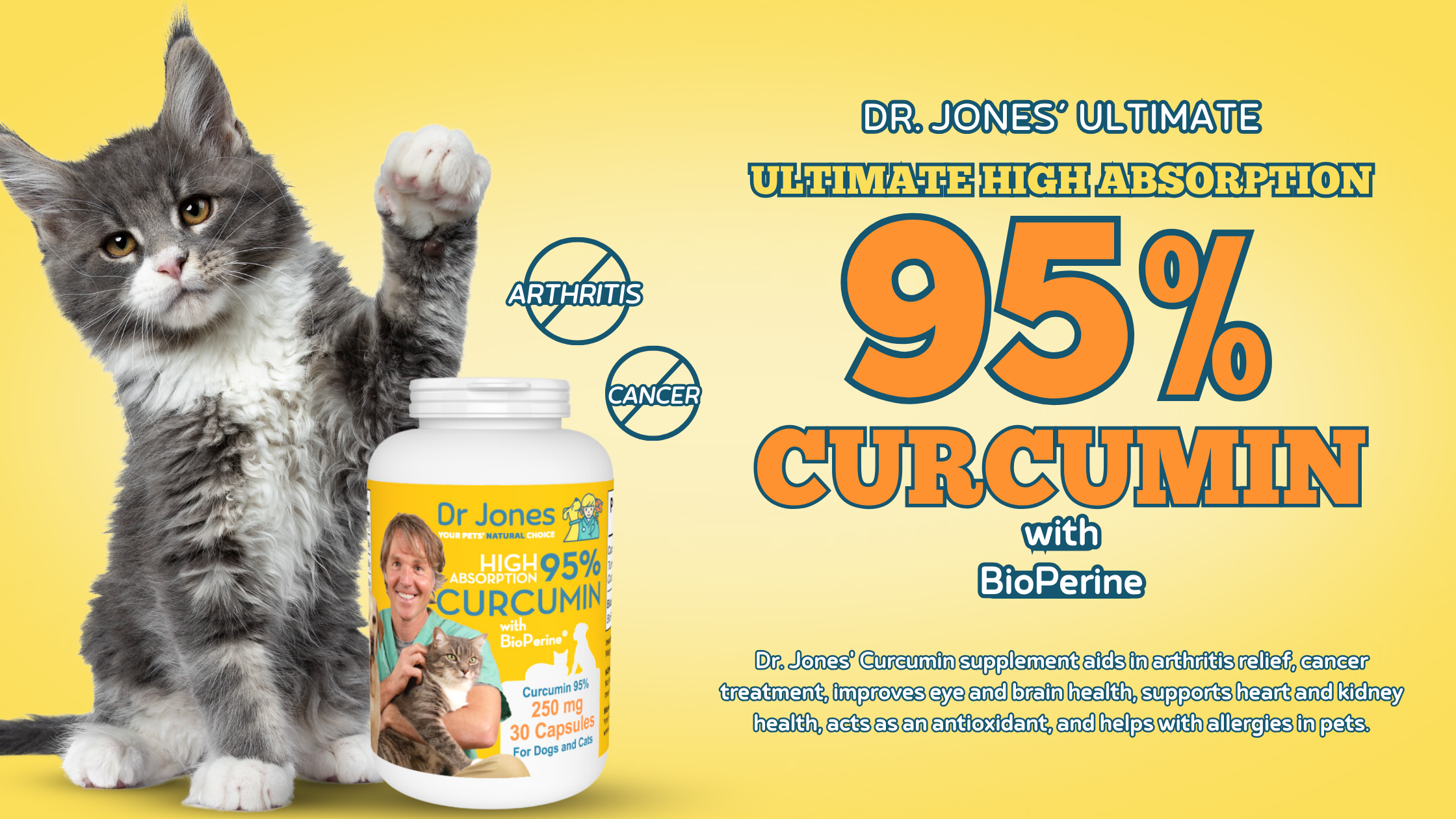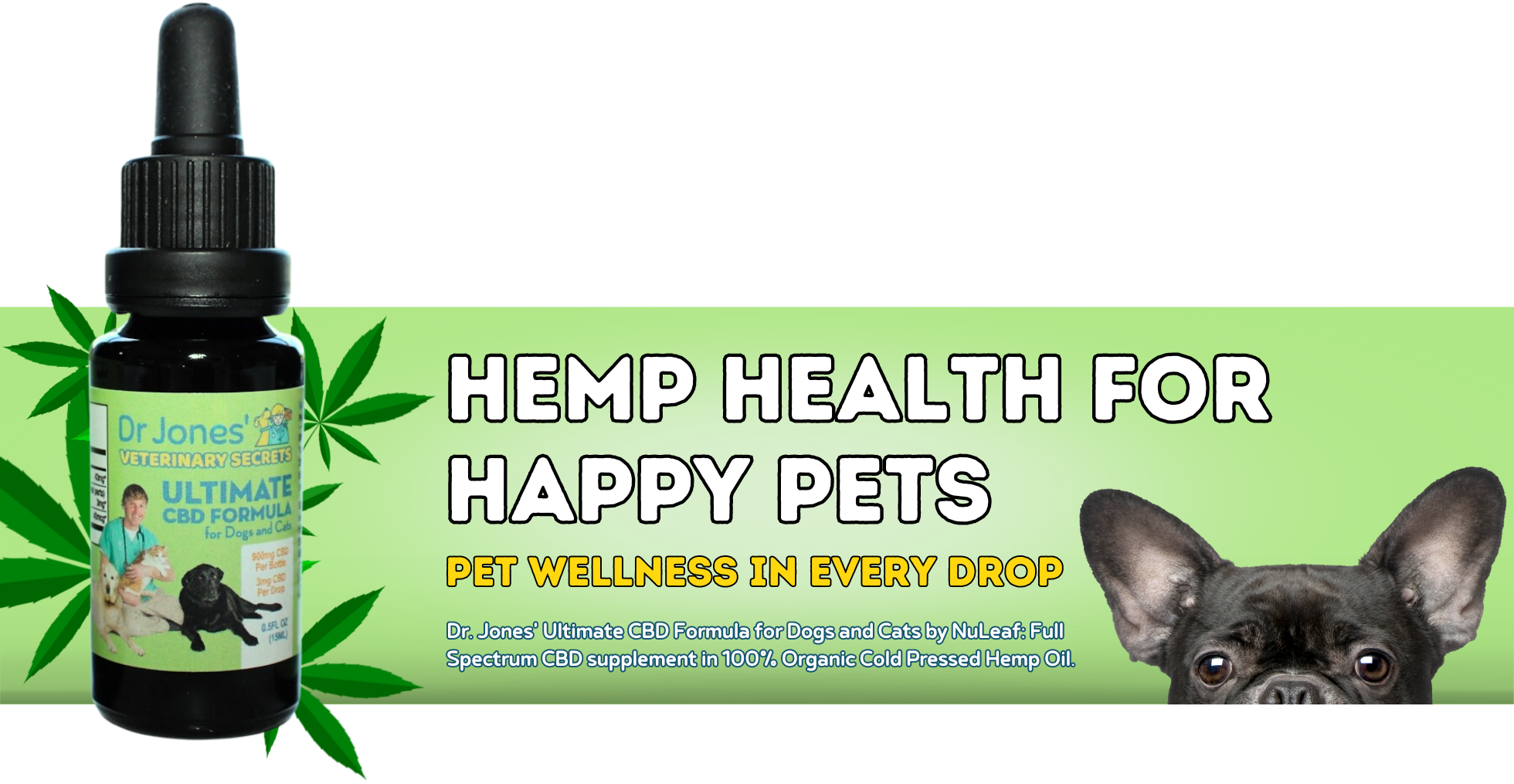Quick Treatment Tips for Cognitive Decline

Unfortunately our dogs and cats do get Alzheimer like conditions. In veterinary medicine we call it ‘cognitive dysfunction’. The brain is an organ that ages, and when the cells of the brain are affected, the brain doesn’t work as well.
Problems thinking and remembering?
It happens to all of us to some degree, BUT there are supplements that have been shown to help delay cognitive decline.
Natural antioxidants like omega-3 fatty acids, and astaxanthin can help protect the brain.
Our supplement, Dr Jones’ ULTIMATE Omega 3 Formula for Dogs and Cats is a 100% natural Krill oil, rich in the anti-inflammatory omega 3’s (EPA and DHA), as well as having the extremely beneficial antioxidant, Astaxanthin.
My dog Tula is 12, and I (Dr J) are getting older, so we are both taking them daily. 🙂
Dr Jones’ ULTIMATE Omega 3 Formula is may help, and it is found by clicking the link here!


How to Help your Dog (or Cat) with Cognitive Dysfunction
This is similar to Alzheimer’s in people. Dogs and cats accumulate deposits of beta-amyloid (a protein plaque) in the brain with age. Pets show signs similar to people with Alzheimer’s.
SIGNS
Your pet sleeps much more and plays less. He has a graying muzzle, poorer hearing and poorer vision. You may see cataracts. He may show abnormal signs, such as pacing, excessive panting, and barking at the wall.
Common symptoms of Cognitive Dysfunction:
- Increased sleeping
- Appear confused
- Loss of training – i.e. house training
- Unable to recognize familiar people
- Lack of interest in surroundings/events
- Increased drinking/increased urination
- Decreased, occasionally increased appetite
- Excessive panting
- Unusual behaviors – i.e. staring at the wall
- Excessive barking
- Deafness
- Overall less interest/activity – appearing “old"
CAUSES
Your dog is considered a senior when past the age of seven. Most cats are not considered seniors until the age of 10. Older pets have natural organ changes: eyes often develop cataracts; the bones of the middle ear often fuse, resulting in lowered hearing; joints lose their soft cartilage covering, resulting in arthritis; and the brain can age, resulting in signs of senility.
Known contributors to cognitive decline:
- Barbiturates such as the common drug for epilepsy, Phenobarbital
- Valium and related drugs
- Gas anesthetic
- Drugs used to increase heart rate, typically during anesthesia (anticholinergics)
- Chemotherapy drugs for cancer
- One of the most commonly prescribed veterinary drugs, steroids, such as prednisone
SOLUTIONS
BEHAVIOR and ENVIRONMENT MODIFICATION
CCD treatment involves management of behavior and environments, enhanced diet, and medication. Its dual goals are slowing the disease’s progress and improving quality of life for dogs and their people. “Behavior can be effectively managed by providing daytime activities and opportunity for play, and structured social interaction for physical and mental stimulation, “
“Exposure to sunlight will help regulate the sleep-wake cycle. If they can’t walk anymore, use a wagon or a stroller. Anything to get them sunlight and stimulation
Not letting the dog act elderly is vital. Don’t treat the dog as old.
Understand there are limitations, but don’t give up on that dog. You have to keep walking the dog – especially now."
“Managing the environment is very important, " “Make it more predictable. You pet-proof the house just as you’d toddler-proof it."
Providing adequate toileting opportunities is important, as old dogs can’t “hold it" as they did when they were younger. Diapers, pads, and waterproof bed and furniture covers can be helpful.
SUPPLEMENTS and NATURAL OPTIONS
- ANTIOXIDANTS – Taurine, Flavonoids, Coenzyme Q, Astaxanthin. The basis of this is that cell damage releases free radicals, and this damages the brain. A varied diet, and additional antioxidants may help, such as CoQ 10 or Astaxanthin. CoQ 10 dose of 20mg/10lbs daily.
- ALPHA-LIPOIC ACID – An increasingly talked about supplement for people, it can have benefits for your pet. It is an antioxidant, found in every cell in the body, and one of its main purposes is to convert sugar into energy. Being an antioxidant it also helps protect the cells of the body against free radical damage. Free radicals are the result of normal cellular reactions; they themselves cause harmful cell reactions, but alpha-lipoic acid can protect against this. Of special note, most antioxidants only work in water (i.e. Vitamin C) or fatty tissues (Vitamin E); alpha-lipoic acid works in both. The alpha-lipoic dose is 10mg per 10lbs daily.
- FLAVONOIDS – These are compounds in a class of their own. They compose the thousands of structures that give the bright color to fruits and vegetables. They are antioxidants as well as having anti-cancer properties. These include flavones, (apigenin), isoflavones (genistein), and flavonols (quercetin). Purchase a mixed bioflavonoid product that contains polyphenols, particularly EGCG (epigallocatechin-gallate), which is the specific flavonoid isolated from green tea. The dose for a 10 lb dog or cat is 250 mg daily.
- MELATONIN – Frequently used for older pets that have trouble getting to sleep and pace at night. Melatonin also makes the mitochondria more effective. It is also an ANTIOXIDANT. For dogs and cats, give 1mg/10lbs up to 6mg 1 hr. before bedtime and on an empty stomach. Try it for 2 weeks to assess if it is working.
NEWER HOLISTIC OPTIONS
CURCUMIN
New research in people has shown a strong link between chronic inflammation, and degenerative brain disorders, such as cognitive dysfunction. Researchers are implicating diets high in grains, along with repeated vaccines as potential underlying causes. The active ingredient in the spice turmeric is curcumin, and this is shown to be effective in people with Alzheimer’s. The animal 95% curcuminoid dose is 100mg per 10lbs daily. Our 95% curcumin is more bioavailable, being dosed at 250mg/50lbs daily.

MCT OIL
Efficacy of a Therapeutic Diet on Dogs With Signs of Cognitive Dysfunction Syndrome (CDS): A Prospective Double Blinded Placebo Controlled Clinical Study ‘Dogs fed the 6.5% MCT diet showed significant improvement over baseline in all 6 categories of CDS signs including three categories related to brain cognitive functions’ MCT oil doses: Start low at ½ teaspoon/10lbs day, slowly increasing the amount to 1 teaspoon/10lbs twice daily
CBD OIL
Using CBD (Cannabidiol) to Treat the Symptoms of Alzheimer’s & Other Dementias ‘According to researchers at California’s Salk Institute, their 2017 study has found evidence that cannabinoids such as CBD could help remove dementia from brain cells’ CBD dose 1mg/10lbs twice daily, although some of the research shows doses at 10 times that amount. Our CBD has been getting some great reviews!
shop.veterinarysecrets.com/supplements/ultimate-cbd.html

OMEGA 3 FATTY ACIDS
These miraculous healthy fats have shown remarkable benefits in supporting brain health and reducing cognitive decline in our dogs and cats. Studies have revealed that omega-3 fatty acids have anti-inflammatory properties that can help reduce brain inflammation, a common factor in cognitive dysfunction. Additionally, these essential fatty acids promote healthy neuronal communication, enhancing cognitive function and memory in pets. By incorporating omega-3 supplements into your furry friend’s diet, you can potentially improve their cognitive abilities, increase their alertness, and even slow down the progression of cognitive decline.
Best Wishes,
Dr Andrew
P.S. If I were to be stranded on a desert island, and I could ONLY take one supplement with me… .it would be the Omega 3 Fatty Acid Supplements!
P.P.S. A great supplement for your pets with Cognitive decline:
Omega 3 Fatty Acids are considered to be one of the most important supplements in Veterinary Medicine(Clinician’s Brief). Dr Jones’ Natural Krill Oil provides high levels of the important Fatty Acids, EPA and DHA, better absorption/bioavailability, WITHOUT the toxins now found in many Fish Oil supplements.
Krill Oil can be especially beneficial for cognitive decline as it is high in EPA and DHA, as well as containing the very effective antioxidant, Astaxanthin.
An easy way to potentially help the brain… .

I am looking for a monthly heartworm preventative, natural and holistic if possible. Can you help me please?
I live in Tennessee and we do have mosquitoes in the summertime. My dog will be wearing a flea and tick collar made with essential oils. Thanks
Worms give many people the ‘heebie jeebies’, and the lastthing you want is to have your dog/cat having a worm in their heart…
Fortunately for most of us, the chance of this ever happening is incredibly unlikely, BUT I would suggest a supplement that can help keep your pet’s heart strong and functionally normally.
Omega 3 Fatty Acids are one of the few supplements documented maintain and potentially improve cardiac function.
We now have an Omega 3 Fatty Acid supplement in the form of Krill oil, which has a high level of the anti-inflammatory Essential Fatty Acids, EPA and DHA- also very beneficial for Allergies and Arthritis.
If you have yet to try them, they are definitely worth a try.
Heartworm: Is Medication Needed?
Heartworm disease in dogs – it’s a potentially very serious disease, which sounds very ominous.
What could be worse than a parasitic disease of the heart?
The American Heartworm Society has produced this infographic showing what percent of dogs leave the clinic without a heartworm preventive. The idea being MORE dogs need to be on them.
But do they?
One of the more common questions I was asked by pet owners was whether or not their dog really needed to be on a conventional preventive medication. More often than not, most clients are told only one thing: to give their dog a monthly Heartworm preventive. In this article I’ll explain exactly what is heartworm, the causes of heartworm, determining if your dog needs to be on a preventive heartworm medication, and the holistic options available to prevent heartworm in pets.
Heartworm (Dirofilaria immitis) is a parasitic worm which infects mostly dogs. Although all internal parasites can be harmful to your pet, heartworm infestation is serious and can be cause death. The worm mainly affects the lung arteries, and clinical signs are associated with damage to the lungs, and then the heart.
Heartworm is spread by mosquitoes. Not all mosquitoes carry heartworm, but when an infected mosquito bites your pet, it can transfer larvae to the animal’s tissues. The worms require development in the mosquito at a temperatures above 27 °C (80 °F) ; below 14 °C (57 °F), development cannot occur, and the cycle will be halted. If the temperature is warm enough, and the heartworm larvae progresses to being infective, they can infect another dog. These larvae then migrate through the body, until they reach the animal’s heart and lungs. There the adult worms will grow. They can grow to 70 -110 cm long and cause a great deal of damage to the heart and lungs.
Dogs show no sign of infection with heartworm during the first 6 months. The first signs include a cough, especially after exercise. As the disease advances, signs can include fainting, pronounced coughing, syncope, crackles in the lungs, general weakness, and heart failure. In serious cases of heartworm disease, it can lead to sudden death.
Most (certainly not all) holistic veterinarians consider the use of pharmaceutical preventatives to be less harmful than a heartworm infection. What you need to be aware of is the incidence of Heartworm in your area, and whether or not your pet really is at risk of Heartworm disease. For example in Canada, Heartworm is difficult to acquire, and usually not fatal; far less than the dire warnings and marketing claims of the Heartworm preventive companies. For heartworm to be transmitted to your pet, you need the correct temperature for a long enough period of time, the right climate, and the correct species and sex of mosquito.
Medication Side Effects.
Most of the conventional heartworm preventives are relatively safe, but there are concerns NOW about heartworm resistance (ie we have used the same medication for so long that the microfilaria are no longer susceptible…)
This has led to ‘newer’ generation Heartworm meds, such as Proheart… but it has it’s own issues/serious side effects…
Severe allergic reactions (anaphylaxis): facial swelling, itching, difficulty breathing, collapse; lethargy (sluggishness); not eating or losing interest in food; any change in activity level; seizures; vomiting and/or diarrhea (with and without blood); weight loss; pale gums, increased thirst or urination, weakness, bleeding, bruising; rare instances of death. This product was voluntarily withdrawn from the market in 2004 because of deaths but has been reintroduced.
Holistic Heartworm Prevention
Holistic heartworm prevention options include many common sense natural health suggestions to keep your dog’s immune system healthy, along with preventing mosquito bites.
First, avoid unnecessary vaccines- keep your dog’s immune system healthy.
Avoid repeated uses of steroids, or conventional antibiotics.
Provide excellent nutritionby feeding quality natural brands of dog food, home diets and raw food. Ensure that the diet includes certain nutraceuticals that help prime the immune response; essential fatty acids in adequate levels, probiotics, and consider the use of colostrum.
My supplement Ultimate Canine Health Formula, contains these ingredients.
Practice excellent mosquito control, as this is the insect that spreads heartworm. I have had some great success with a natural mosquito repellent using cedarwood oil.
‘New’ Natural Flea/Mosquito Spray
Witch Hazel with Aloe: 1/2 cup (120ml)
Liquid coconut oil: 1/4 cup (60ml)
Neem Oil (warmed to liquid state): 2.5ml (2.5 dropperfuls)
Lavender Essential Oil: 20 drops (1ml)
One study said this…
Repellent action of neem oil was evaluated against different mosquito species. 2% neem oil mixed in coconut oil provided 96-100% protection from anophelines, 85% from Aedes, 37.5% from Armigeres whereas it showed wide range of efficacy from 61-94% against Culex spp. Therefore, neem oil can be applied as a personal protection measure against mosquito bites.
Regular Testing:This is inexpensive, and important if you are in an area where heartworm exists… . especially if you are not giving the preventive medication.
Use natural alternatives when possible:This can mean using nosodes and herbal supplements, while also having your dog tested for heartworm. This is better under the guidance of a holistic veterinarian.
Dr Steve Marden’s Heartworm Regimen
This formula is from Steve Marsden DVM, in the Manual of Natural Veterinary Medicine.Again, don’t use it on your own because you’ll need a holistic vet’s advice on dosing.
The tincture blend contains:
* 14 ml ginger
* 9 ml wormwood*
* 4 ml garlic
* 14 ml thyme
* 9 ml cinnamon
Dosage: Ask your holistic vet or herbalist about the right dosage for your dog. Dr Marsden suggests a starting dose of 0.1 ml per 5 lbs of body weight, divided into 2 or 3 doses per day.
*Wormwood can cause gastrointestinal irritation. Giving the tincture separately in a gelatin capsule with meals can reduce the effect.
Added Bromelain
Dr Marsden has used the above herbal blend successfully in his practice.He gives it along with Bromelain.Bromelain is an enzyme extracted from pineapples. It helps break down the dead worms.This can lower the chances of your dog getting a pulmonary embolism from worm die-off.
Dr Marsden recommends a starting dose of 30 mg per lb of body weight. Divide this into two or three daily doses and give it two hours away from meals.
About Monthly Preventives…
My thoughts on conventional use of monthly heartworm preventives are this: If you are in a high risk area, use the conventional preventives, but for as short duration as possible – ie when the conditions really exist to transmit the disease.
Use the lowest effective dose of the preventives; you can also follow up the conventional meds with liver supportive products such as milk thistle and Vitamin E. If you live in an area with little to no risk of heartworm, consider no use of conventional medication.
You should now have a better understanding of what heartworm is in dogs, and how it is spread from dog to dog. Now you know the clinical signs of heartworm infection, plus are able to determine whether or not your dog needs heartworm preventives based on the incidence in your area.
Lastly you can use some of the suggested holistic modalities to prevent heartworm, avoiding the potential side effects of the conventional heartworm drugs.
P.S. Is Heartworm serious… Yes
Does your dog NEED to be on Heartworm Preventive?
In many cases… .likely not.
P.P.S. An easy way to help your pet’s heart (and joints, skin and brain!)
Omega 3 Fatty Acids are considered to be one of the most important supplements in Veterinary Medicine(Clinician’s Brief). Dr Jones’ Natural Krill Oil provides high levels of the important Fatty Acids, EPA and DHA, better absorption/bioavailability, WITHOUT the toxins now found in many Fish Oil supplements.